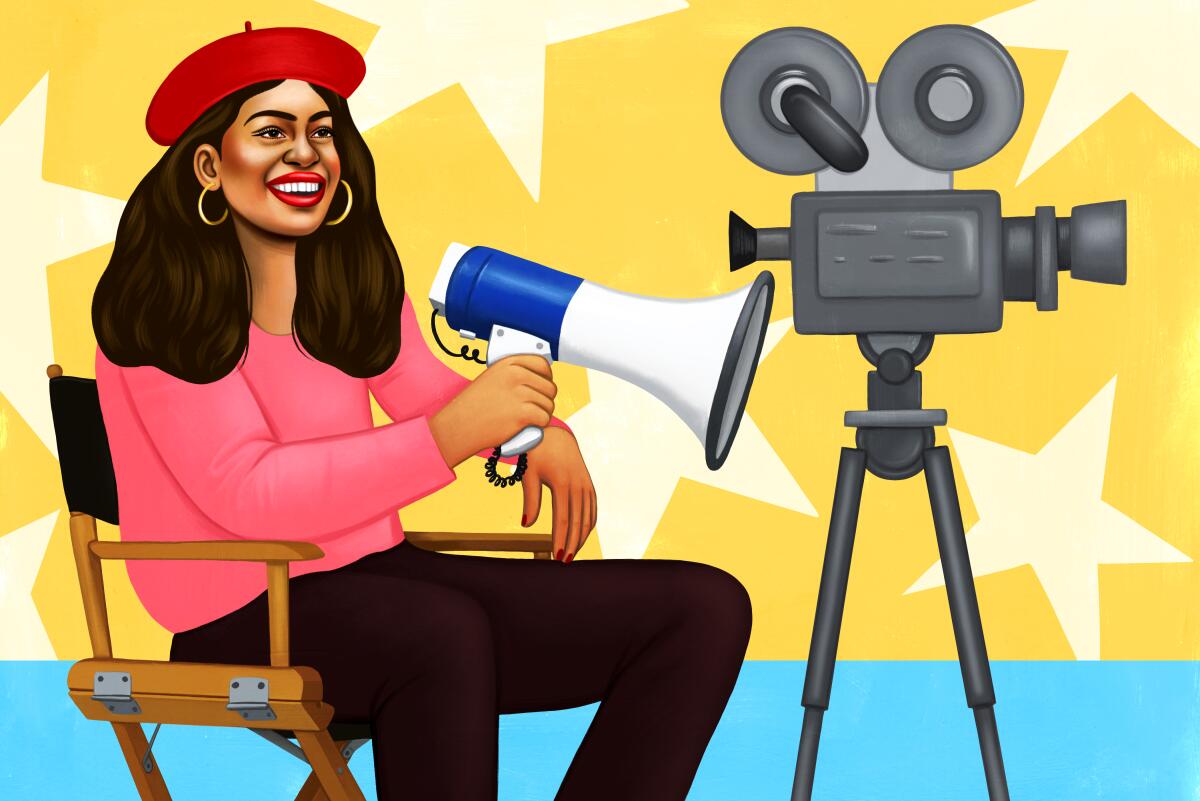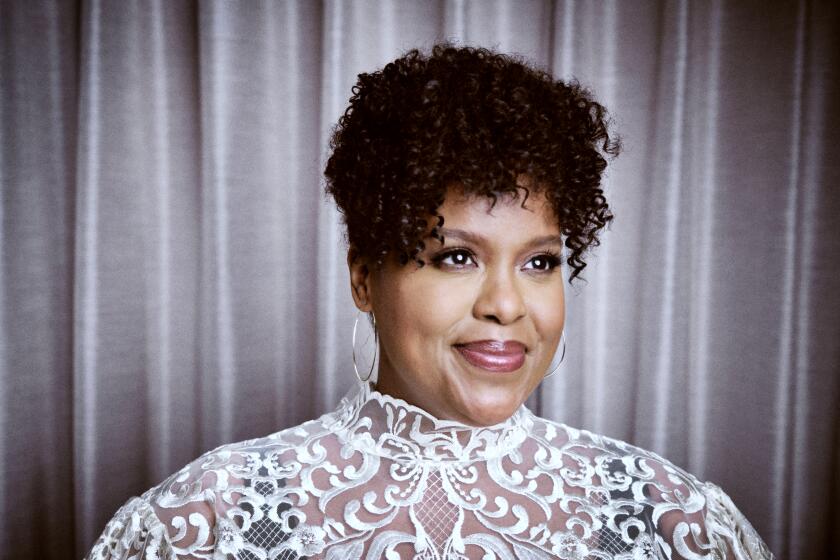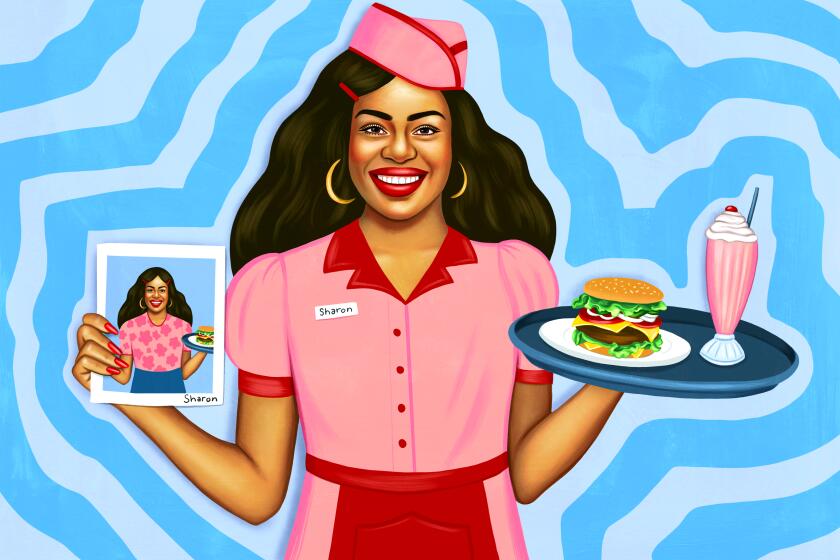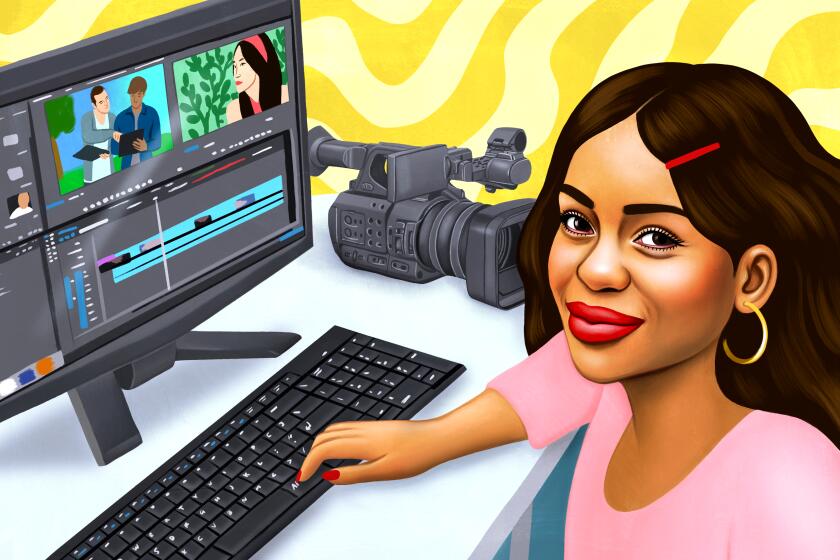Explaining Hollywood: How to get a job as a TV director

- Share via
When Ava DuVernay launched “Queen Sugar” on the OWN Network in 2016, she hired only women as directors — a practice she’s continued through six seasons of the Louisiana-set family drama.
About 17% of TV episodes from the 2015-16 season were directed by women, according to statistics from the Directors Guild of America, so she wanted to give directing opportunities to accomplished women who were still struggling to get work. A more recent DGA report shows improvement: Women made up 34% of the directors of the 2019-20 season.
Historically, network television was seen as creatively limiting, compared with film. But now, especially with the rise of streaming, television is not only widely respected but also where most of the job opportunities are.
But it’s still extremely competitive, regardless of gender.
“TV is such a different structure and hierarchical system than film, so it’s always hard for any film director who’s not an A-lister, let alone a female film director, to get their first gig in TV directing,” said Bertha Bay-Sa Pan.
Pan has been directing since she won awards for her first short, “Face,” in 1997, which eventually became her first feature film of the same name in 2002. She’s since directed a second feature and has continued to work both in the American and Chinese film industries. But she just directed her first TV episode — on “Queen Sugar” — in April.
Shaz Bennett started as a film festival programmer, eventually becoming the director of programming for the AFI Fest, before directing her first feature, “Alaska Is a Drag,” and working as a TV writer. She also had her first TV directing break on “Queen Sugar” in 2018.
“All of us had been, you know, really close a bunch of times, on a bunch of shows. ... You just need that one person to say, ‘Go! I trust you,’” Bennett said.
She has since directed episodes of “Billions,” “Ordinary Joe” and “Animal Kingdom,” and she returned to “Queen Sugar” this year as a director, writer and co-executive producer.
Why is it so hard to break in? And how can you best prepare — so that one day a showrunner like DuVernay might give you a call?
Here’s some advice from Pan; Bennett; Rebecca Windsor, who runs the Warner Bros. Television Directors’ Workshop; Juan Jose Hernandez, the senior manager of the ViacomCBS ViewFinder Emerging Directors Program; and Wyatt Muma, senior coordinator of the ViacomCBS Directing Initiative.
What does a TV writer do? How do you become one? How do you move up? How much money can you make? The L.A. Times is explaining the entertainment industry — here’s what you need to know about being a TV writer.
Who becomes a TV director?
Directing for TV requires versatility and an ability to bring someone else’s vision to life. While film is a director’s medium, the main creative forces behind television are the showrunners and writers.
“This is someone else’s baby,” Pan said. “They are asking you to temporarily babysit, and you just have to do everything that the baby’s parents asked you to do.”
What is the draw of being what she called “one little patch on a broader tapestry” as a TV director, for those who have previously had full creative control over their films? Pan loves that she can concentrate on the craft of directing without having to carry the entire burden of the production.
“It’s already a very well-structured power machine, and I can just go in and just focus on the parts that I really enjoy,” she said.
“That’s such a gift,” said Bennett, “especially coming from the indie film world, where you’re kind of everything. You’re the writer, the director, the producer, sometimes the editor and the sound designer.”
While some shows have regular directors, it’s also common for a TV director to come in as a guest for a few weeks to help the team execute one particular episode’s vision. So TV directors need to be very collaborative.
TV directors can also jump between different genres and styles more easily than feature film directors, who may work on a single project for multiple years. On “Queen Sugar,” Bennett enjoyed being able to direct a very lush and visual family drama. On “Billions,” she got to work on a show with quippy dialogue where actors have to follow a very precise script. On “Animal Kingdom,” she directed fight scenes.
“You’re directing constantly, so you’re honing your skills,” said Windsor. “You’re working with different crews, different actors, being challenged by different environments. ... You sometimes get to use different cool tools and gadgets. So you’re actually expanding your skillset as a director, and I think it’s still really creatively fulfilling.”
The multi-hyphenate calls her directorial debut for the HBO series ‘a call to arms for authenticity.’ But getting there took a lot of growth.
How do you get started?
TV directing is one of the hardest career paths to break into, said Windsor, who runs both the writing and directing TV workshops for Warner Bros.
She compares the two: “If you are successful and get a job as a staff writer, you are one of many on a writing staff, you are the low man on the totem pole, so the expectation is not that you’re going to come in and know everything,” she said. “You’re there to contribute ideas and to learn and to grow and be helpful to the process.
“But as the director, you are coming in as someone who hasn’t done this before, but you are the captain of the ship. You’re the leader. That’s why it’s so much more challenging. You have to find showrunners and producers and studios who are comfortable handing over the reins of their $5-million baby to somebody who hasn’t done it before.”
There are many ways people end up getting their first breaks in television episodic directing, but there are three ways that, anecdotally, seem to be the most common.
Building up your directing portfolio in other mediums
To get a job directing TV, you often have to have a body of work outside of television, whether it’s directing films, documentaries, commercials or music videos.
That is difficult, Windsor acknowledged, because unlike writing, which can be done alone with a laptop, directing even a short film requires a significant amount of money, time, people and resources.
But having a strong portfolio that showcases your skills makes it easier for a showrunner to take a chance on you.
Working in television in another capacity
Another way people break in is by working on the set of a show for years, even if they haven’t directed before. It’s less of a risk to take a chance on an actor, writer, cinematographer or editor who is already familiar with the inner workings of a show.
Applying for a fellowship program
The major Hollywood studios have diversity fellowship programs meant to support emerging directors who would otherwise not get these opportunities.
The programs vary, but most of them involve classes, training, mentorship and shadowing — where a fellow can follow a director through the preproduction, physical production and postproduction process. This sets up the fellow to have the skills to direct their own episode.
Shadowing, outside of a formal fellowship program, usually only happens through personal connections, though there are some programs, like Ryan Murphy’s Half Initiative, that allow people to apply for shadowing and mentorship opportunities.
In the last few years, the DGA has been pressuring the studio directing fellowship programs to guarantee that each fellow will get the chance to direct an episode.
“I know some people who shadowed a very long time and never got an episode,” said Bennett. “So it’s a very useful way to learn to direct, but I don’t know that it’s a useful way of getting hired.”
Actors who have chosen to pursue Hollywood later in life as a second career share their experiences and advice.
What are the career paths?
In television, there are multicam comedies — think sitcoms like “Friends” and “The Big Bang Theory” — which have laugh tracks. Those are shot more like theater with live audiences. And there are single-camera shows that are shot more like a film, whether they are half-hour comedies or hour-long dramas.
Multicamera comedy is often its own career path because of the specific nature of the production. Directors of single-camera shows can be pigeonholed into comedy or drama, but many are able to bounce between genres.
Hernandez said it’s important to figure out exactly where your interests lie, whether it be directing multicam comedies or hour-long single-cam dramas, so that you can figure out how to work on your craft.
Like most of Hollywood, there is no single path, and you need to know people to get more jobs. It’s very difficult to get your very first TV-directing gig, and it’s also very difficult to get your second one. But the idea is that once you get enough episodes and show that people are hiring you back, it should get easier.
ViacomCBS has two programs that act as a ladder system. The Viewfinder Emerging Director’s Program acts as a launchpad for first-time TV directors. Their Director Initiative is for DGA members only — less about training and more about giving aspiring TV directors networking opportunities with directors, producers and executives so they can book more work.
For many people who pursue entertainment as a career, it takes years to get yourself to where you are making money from your creative work. For making money in the meantime, there’s always waiting tables. But more and more people are turning to platforms like TikTok, Twitch and Patreon.
How do you make money? (And what kind of money?)
Career sustainability is one of the main reasons that directors want to go into television. Some direct TV full time, while others supplement it with other projects.
“You’re not working for very long,” Windsor said. “So hypothetically, if you direct, say, five shows in a year, that’s only a few months of work. You can live off that for the rest of the year, and then you can spend the other six months of the year focused on your passion project.”
The DGA has rate cards for pilot episodes, the first episode of a series which is used to sell the show to a network, as well as television shows. The rates vary depending on whether you’re directing for a network, cable or non-network show, how long the episodes are and what kind of budget the production has.
Minimums range from $12,721 an episode for a half-hour non-network show, to $25,432 an episode for an hourlong drama on basic cable, to $135,287 for a two-hour program on network prime-time television.
TV directors also receive residuals, extra compensation for their work when it’s used for reruns, home video and on-demand. Residuals account for a significant amount of money: According to the DGA, it distributes nearly half a billion dollars a year in member residuals. The DGA negotiates these deals, and there are different formulas depending on how and where the work is distributed or exhibited.
How is this career different than it was 10 or 25 years ago?
Before Windsor worked at Warner Bros., she worked at the Sundance Film Festival, and she remembers indie filmmakers not wanting to work in television, even if they were struggling to make a living directing movies.
Now, streaming services such as Netflix, Amazon Prime and Apple TV+ are all trying to carve out an identity in the film and television worlds. There are also many more cable channels doing original programming — like FX, SyFy, AMC — and the big networks are investing in programming made specifically for their streaming channels (Disney+, Paramount+, Peacock).
“A lot of times, directors think they have to fit a certain mold, because we’re working in network television, which can often come out a little cookie cutter,” said Muma. “But I think that more than ever, we are looking for strong voices and people who have that point of view that is unique.”
A guide to becoming a film editor in Hollywood.
What advice do pros always hear that is wrong?
Bennett said that there was a perception for years that the director has to be very tough. She considers herself soft-spoken.
“You just have to figure out what kind of director you are,” she said. “And, you know, I’m not gonna be somebody who’s yelling and screaming, but I will get what I need out of the take.”
When she’s directing a television episode, she thinks of herself like a cheerleader. She tries to bring positive energy and show that she’s happy to be there.
“You have to be somebody people want to spend a lot of time with,” she said. “In TV, you’re working 14 to 15 hours a day with somebody — oftentimes you’re spending more time with us than you are your own family. You want to be somebody who’s not annoying.”
Every year, thousands of kids decide they want to try to land jobs as professional actors. The learning curve for parents is steep, and the path can be costly.
What’s some good advice?
Get experience as a crew member
Pan said an executive once told her that TV directors are hired based on who can “win over the trust of the cast and crew in the shortest amount of time.”
It’s easier to win over the crew if you know what it’s like to be on a crew. Pan was a dialect coach on the HBO show “Oz” for three years; she’s also been a production assistant, an acting coach and a craft services worker. That helped her understand how to communicate with the crew, handle the fast pace of TV and recognize how to not get in the way when someone’s trying to get their job done.
Bennett was also a production assistant. She said that if you want to learn to direct, you want to be near the director, so try to get a job assisting the director or the cinematographer.
“You’re right there next to the camera, so you’re picking up what the director’s doing,” she said. “The more opportunity you have to be in the middle of it, [the better]. I’ve had the jobs where I’ve been the PA holding traffic two miles away, but I didn’t learn as much from those jobs.”
Apply to fellowship programs
Of course there are the people who only apply to one program and get in on the first try, but be prepared to apply multiple times to multiple programs. Over the years, Bennett has participated in the AFI Directing Program for Women, Fox’s Franchise Directing program, the HALF program and Sundance Screenwriting Labs.
“The hardest thing about getting into all those programs is not only having great samples that show you can direct, but then also having the the patience to sit and fill out all the forms,” she said. “Because there’ll be 50 questions about, like, ‘Why did you choose this shot over that shot?” Being able to articulate your artistic vision and why you wanted to direct it this way — these are all skill sets that you will use at a later point.”
Windsor recommends creating a portfolio that showcases your range of skills — whether it’s getting great performances out of actors, nailing a certain visual style or showing how your sensibility will be a great fit for a particular show (produced by the studio you’re applying for) that you’d love to direct one day.
“We are looking for strong voices and people who have that point of view that is unique,” Muma said. “So that’s your superpower. Lean into that.”
In addition to the studio-run fellowships — ViacomCBS, Disney/ABC, HBO, NBC, Sony and Warner Bros. — that train specifically for TV, there are many broader director training programs, including Film Independent’s Directing Lab and Amplifier Fellowship for Black artists, the CAPE Animation Directors Accelerator, the Los Angeles Latino International Film Festival’s Latinx Inclusion Fellowship Series, UCLA Extension courses, and the DGA Director Development Initiative.
The first step in your Hollywood career shouldn’t be paying L.A. rent. Here’s how to take your first steps toward a career in the entertainment industry, according to experts.
More to Read
Inside the business of entertainment
The Wide Shot brings you news, analysis and insights on everything from streaming wars to production — and what it all means for the future.
You may occasionally receive promotional content from the Los Angeles Times.
















